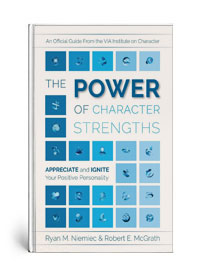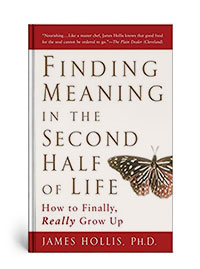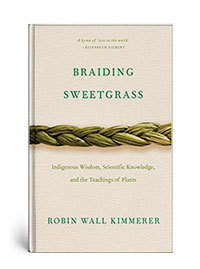Friends,
Welcome to my 11th newsletter. As we embark on a new year, it seems like the perfect time to write about facing the future with confidence – another one of the 13 skills that lead to happiness.
You will recall the model below that identifies 13 skills that enable us to live accomplished, meaningful, joyful lives … or what the science of positive psychology calls flourishing.
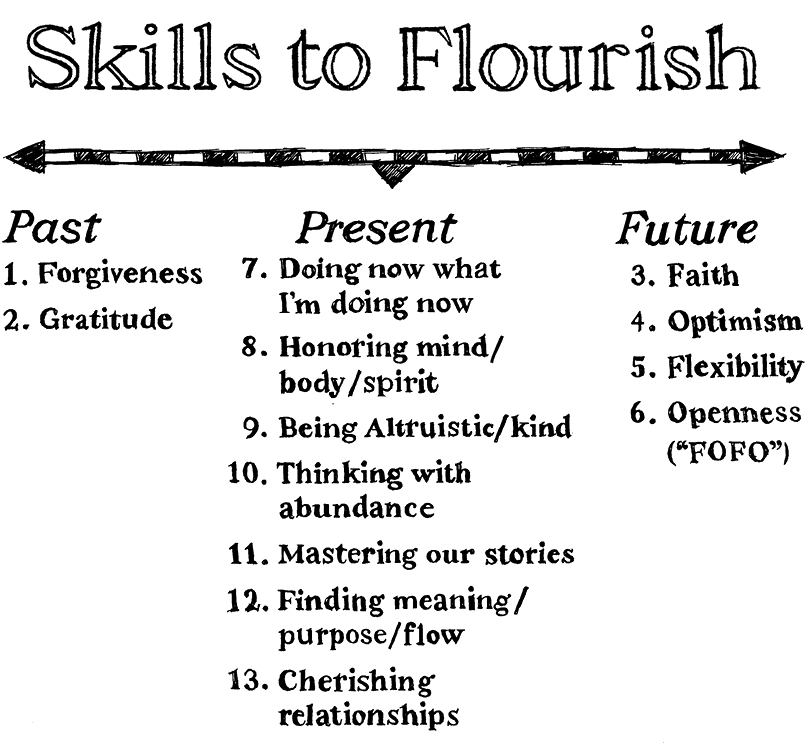
The premise of this model is that if we can have peace with our past and confidence in our future, then we are enabled to live in the present with joy. I will admit that for much of my life, I agonized about situations that had happened in the past, leaving me with feelings of remorse or with anger. And I worried about the future with all kinds of “what ifs” … what if I lose my job, what if this diagnosis is worse than I thought … that I failed to live in the present. I guess I should have thought of this model 30 years ago.
In previous newsletters, I have dealt with forgiveness and gratitude, the two skills that lead to peace with the past. Forgiveness gets junk out of your life while gratitude brings good things into your life. The fact that forgiveness and gratitude lead to happiness is simple arithmetic.
In this letter, I want to share four skills that lead to confidence in the future: Faith, Optimism, Flexibility and Openness or what I call FOFO.
FAITH
Faith is a belief in the future that stands without evidence. By faith, I do not mean simply dogma or doctrine, or even religion, although many of us get to faith through religion. What I am suggesting is that we need to search within ourselves for often hidden sources of strength. Faith is about overcoming the doubts and fears that limit our ability to look beyond the immediate challenges and to believe that we can overcome whatever life throws at us. It is about courage, self-compassion and a belief that if we do our part, then God or the universe will do its part and bring us whatever we need – not necessarily what we want – but always what we need. Without faith, our minds will conjure up all kinds of terrible and frightening scenarios. As Shakespeare wrote: “Without faith, the mind is a cruel master.”
OPTIMISM
Optimism is a close cousin of faith. Optimism is believing in positive outcomes, to be hopeful about the future. Optimism and happiness are closely correlated. Optimists have a unique ability to withstand setbacks. Here is the reason why. When you think optimistically about the future and experience a setback, you tend to make the setback temporary, specific to the event and controllable. After failing a test, the optimistic student will tend to think something like this: “It is just one test. If I study harder for the next test, I will do OK.” When you think pessimistically, you tend to make a setback permanent, universal and uncontrollable. The pessimistic student might respond: “I am so stupid!” Yes, you can be overly optimistic. You want your pilot to think pessimistically about whether or not to de-ice the plane before the snowstorm. But in general, thinking optimistically, while working hard to bring about the desired future, serves us far better than pessimism.
FLEXIBILITY
Most of us approach the future by looking forward and believing that certain actions will automatically bring about the desired results. Sort of like this:

In many ways this approach is healthy. The problem is that we see only one pathway forward. In truth, there are many pathways that will get us where we want to go. Since the future will almost always be different than we imagined, when we only see one path, we tend to get emotionally upset when things don’t go exactly as planned. What we need to do is to remain flexible, adjust to the new reality and find alternate pathways to the desired destination. Helen Keller captured it so well: “When one door to happiness closes another almost always opens, but we are so fixated on the closed door we fail to see the open door.”
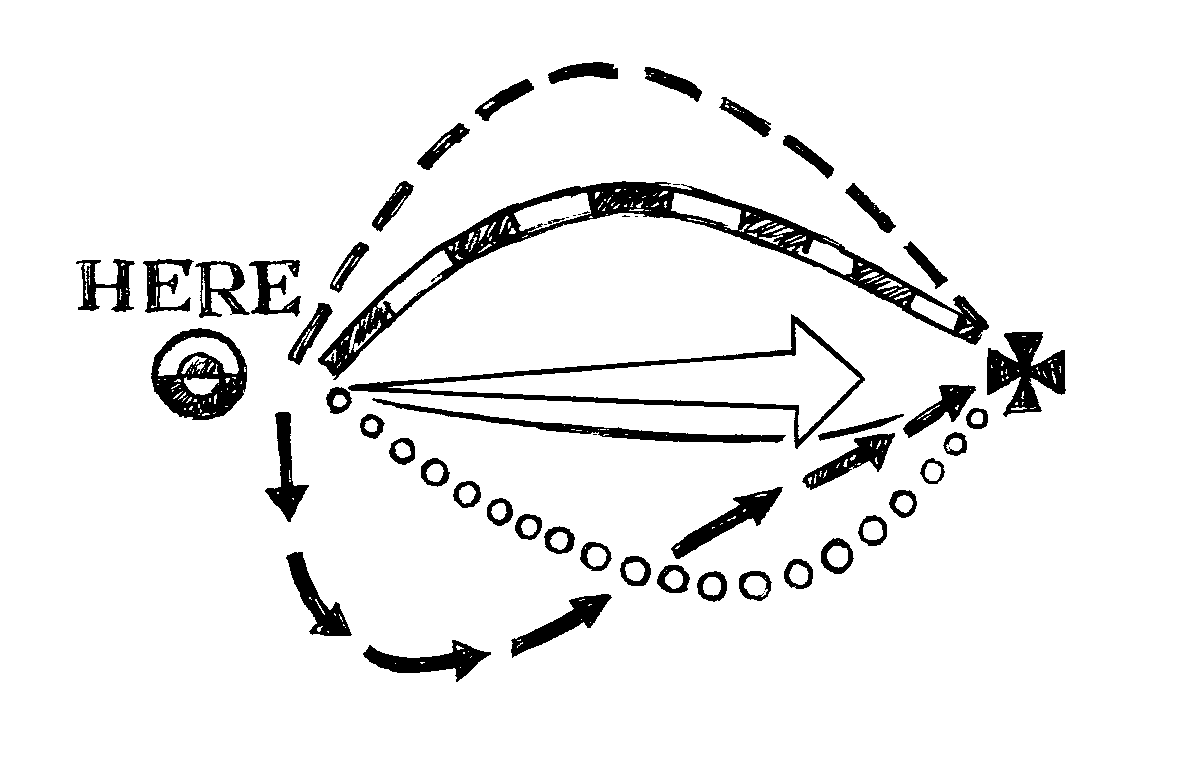
OPENNESS
This last skill of openness is the toughest of all. This skill has to do with adjusting to the notion that our original desired future simply will not happen. Try as we might, sometimes the future just turns out differently than we expected. The lost job, the child that is born with a disability, the diagnosis of a life-threatening illness, these are all things we may not have expected nor desired. Having the ability to accept this new reality, to be open to a life situation that you neither planned nor desired, to accept that sometimes fate throws us a curve-ball, is a wonderful skill and one that is essential to facing the future with confidence. As opposed to lamenting what we had hoped for, it is coming to peace and finding joy where fate takes us. I have found that sometimes the life I planned isn’t half as beautiful as the life that was meant to be. I just wish I had developed the wisdom to understand this much earlier in life.
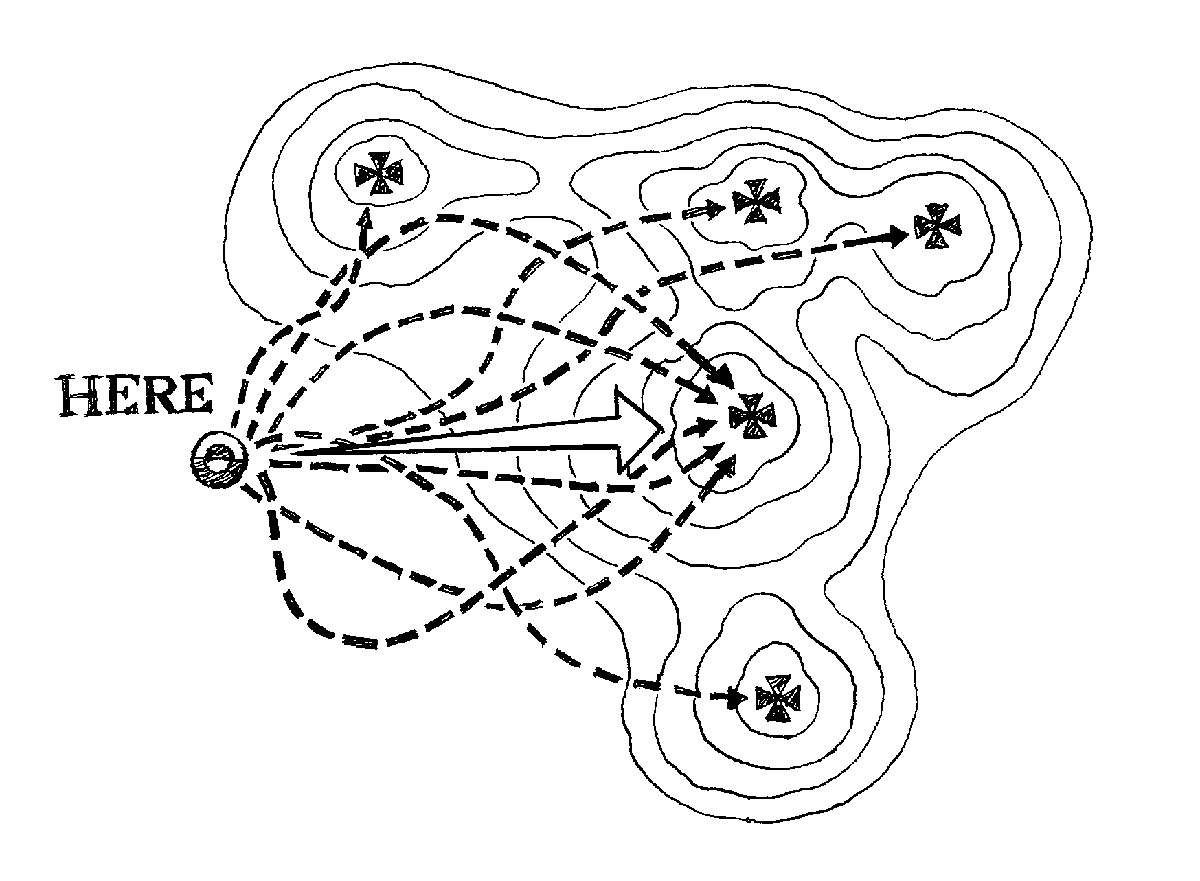
Lao Tzu several thousand years ago captured it well: “What is flexible and open will thrive, what is rigid and blocked will wither and die.”
OK, that is the four skills that lead to confidence in the future. Seems like a good message as the first week of 2020 unfolds. Wishing everyone a wonderful new year; a year filled with faith, optimism, flexibility and openness … a year filled with joy.
Thanks for reading. Be well … in fact, flourish!

–Douglas. A. Smith
“Learning to live with ambiguity is learning to live with how life really is, full of complexities and strange surprises…”
–James Hollis, Author
From the bookshelf!
Books I am reading and highly recommend.

